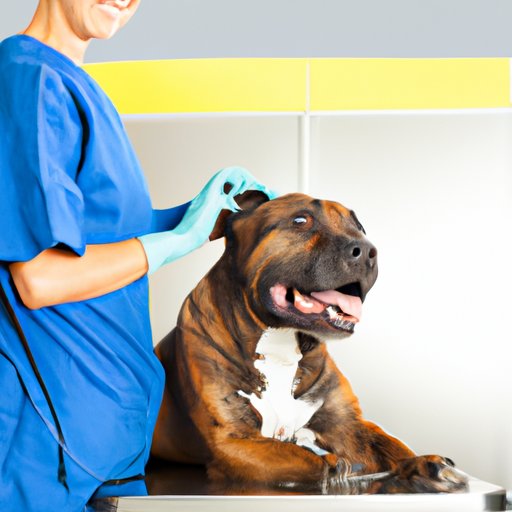Introduction
Having a dog as a pet is a rewarding experience that brings joy, companionship and unconditional love. But it also requires responsibility and dedication in order to provide the best possible care for your furry friend. This article will explore how to take care of a dog, from providing adequate nutrition to scheduling regular vet visits, so that you can be sure your pup is living its best life.
Provide Adequate Nutrition
A balanced diet is essential for any dog’s health. A variety of foods should be included in their meals, such as lean proteins, carbohydrates and healthy fats. Depending on the age and size of your dog, the amount of food should be adjusted accordingly. For example, puppies need more frequent feedings than adult dogs, and large breeds require more food than smaller ones. Quality commercial dog foods are usually formulated to meet the nutritional needs of most dogs. However, if you decide to feed your dog homemade meals, make sure to consult with your veterinarian to ensure your pup is getting the right balance of nutrients.
Ensure Regular Exercise
Regular exercise is important for all dogs, regardless of breed or size. Not only does it keep them physically fit, but it also helps to maintain their mental health by providing stimulation and relieving boredom. Different types of exercise are suitable for different dogs; some may prefer short walks while others may enjoy playing fetch or going for a jog. Generally, the amount of exercise should be tailored to the individual dog’s age and physical condition. If your pup is very young or has any health conditions, talk to your vet to determine what type and amount of exercise is appropriate.
Schedule Regular Vet Visits
Regular check-ups are essential for maintaining your dog’s health. At each visit, your vet will assess your pup’s overall condition and administer any necessary vaccinations. It’s also important to inform your vet about any changes in your dog’s behavior or physical appearance. This way, they can identify any potential health problems early on and take the necessary steps to treat them. Common health issues that should be monitored include dental disease, skin infections, fleas and ticks, heartworm and other parasites.
Practice Positive Reinforcement Training
Positive reinforcement training is the key to teaching your dog good behavior. This type of training relies on rewards rather than punishments to shape desired behaviors. Rewards can come in the form of treats, praise or playtime, and should be given when your pup responds correctly. Strategies for training will vary depending on the individual dog and the behavior you’re trying to teach, but some basic tips include being consistent, having patience and praising successes. With enough practice, your pup will soon understand what is expected of them.
Create a Safe Environment
It’s important to create a safe home environment for your dog. This means keeping dangerous items out of reach, such as cleaning products and medications. Make sure to secure all doors and windows so your pup can’t escape. It’s also important to restrict where your pup can go, as there are many dangers outside, such as other animals, cars and toxic plants. If you plan to take your pup out in public, make sure they are properly restrained and always supervised.
Develop a Grooming Routine
Establishing a grooming routine for your pup is an important part of taking care of them. Grooming helps keep your dog clean and healthy, as well as prevents matting and tangles in the fur. The frequency of grooming will depend on the breed, but generally speaking, brushing should be done at least once a week. Other activities may include trimming nails, cleaning ears and brushing teeth. The right tools are essential for successful grooming, so make sure to invest in quality brushes, combs, nail clippers and toothbrushes.
Conclusion
Taking care of a dog requires dedication and commitment, but the rewards are worth it. By providing adequate nutrition, ensuring regular exercise, scheduling regular vet visits, practicing positive reinforcement training and creating a safe environment, you can be sure your pup is living its best life. Additionally, establishing a grooming routine is an important part of caring for a canine companion. With the proper care, your pup will be happy and healthy for years to come.


